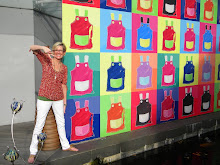Our “V” entry begins with the Latin “venire” meaning “to
come” which is the root of Advent, the wonderful season preceding
Christmas. Christians await the arrival
of our Savior. Families await the arrival of far-away loved ones. Malls await the arrival of shoppers and
profits. All of us await the arrival of
Santa Claus. It’s a time of waiting. Almost. But not yet. We’re excited and full of anticipation. We know something good is ahead.
When my dad died, we found a note in his wallet. “The best is yet to come.” There seems to be something inherent in the
human condition that yearns for something more.
We know that this life is good, we are blessed with food and shelter and
relationship. The world is truly a beautiful, wonderful, mystical moment in this
absurd cosmos.
And yet we sense…something more is possible.
People die in senseless ways. We spend our precious time scrambling after
meaningless things. We hurt each other,
intentionally and accidentally. We make
the same mistakes over and over. We
try. We fail. We try again.
And we wait.
The prophet Joel tells us that mountains will drip new wine
and hills will flow with milk. The
prophet Isaiah speaks of rivers in the desert and lions and lambs and cows and
bears all living together in harmony.
Revelation tells us of a time when tears and pain and death are no
more.
When? When is that
coming? How long must we wait?
That I cannot answer. But every once in awhile, we get a
glimpse of what that could be. It may last a moment or an hour, but it’s enough
to keep us believing. We see what could
be.
On Sunday afternoon, Charlie and I attended a concert. The International Festival Chorus of
Singapore presented a beautiful ceremony of carols and Christmas songs. The concert coincided with World Choral
Day. Did you know there is such a
day? Neither did I. But I really like that such a thing exists in
the world – it’s described as an “event to extol the values of solidarity,
peace and understanding.” We could certainly use more of all. This is their proclamation.
Sing, choirs of the world!
May your voices take springs
there where fire burns.
May your songs put roses
there where battlefields lay.
Open furrow and sow love
to harvest fruits of hope.
Sing to liberty where despot rule,
Sing to equality where poverty nests,
Sing to love where hate prevails.
May your singing direct the world
so that peace takes over wars,
so that all will cherish the earth,
so that all race or color discrimination is banished,
so that we will be together as sisters and brothers
so that this planet rejoices with your voices.
For a moment, I glimpsed the new earth. Joyful voices, joined in harmony, banishing
the darkness, letting the light of love reign.
Then, just a few hours after this concert, reality came hurtling
back at tsunami strength. Our beautiful island
paradise experienced an unusual outburst of violence. The fires burned. The pain imploded. The hate took center stage. It was truly a
sad day.
The vision of living together as brothers and sisters
receded.
And yet…we wait.
For the vision is yet
for the appointed time; it hastens toward the goal and it will not fail. Though
it tarries, wait for it; it will certainly come, it will not delay. Habakkuk
2:3
















